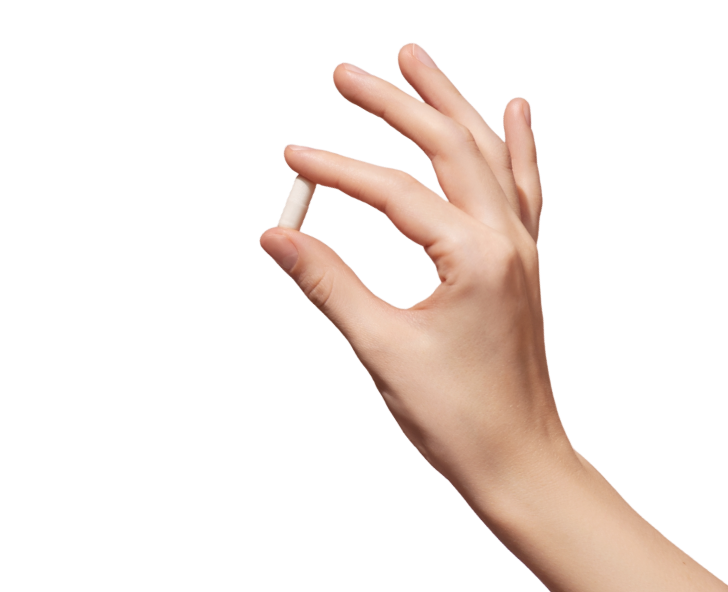Last update: January 21, 2025
5 minute read
What is Butyric Acid?
Discover butyric acid's amazing health benefits for your gut health and inflammation, and learn how it fits into your wellness journey.

By Yerain Abreu, M.S.
Edited by Dr. Dimitar Marinov, MD, RDN, PhD

Butyric acid plays a big role in keeping your gut healthy and happy. Who wouldn't want that, right? By the end of this blog post, you'll be ready to embrace this gut-loving superstar and support your overall wellness goals.
Key takeaways
- Butyric acid is a short-chain fatty acid that supports gut health and inflammation
- You can find it in many food sources, including butter, ghee, and certain cheeses
- Butyric acid supplements are available for people who want to make sure they're getting enough of this beneficial fatty acid
What is butyric acid?
Butyric acid, also known as butanoic acid, is a short-chain fatty acid that is naturally produced in the human body by gut bacteria during the fermentation of dietary fiber and hydrolysis-resistant starches. Some butyrate is also produced as proteins and peptides are digested in the bowel.
Further, it's found in small amounts in some dairy products and meats, such as butter and parmesan cheese. Butyric acid is an important source of energy for the cells that line the colon, and it plays a role in maintaining the health of the gastrointestinal tract.
It's thought to have anti-inflammatory properties and may potentially help reduce the risk of developing certain disorders.

How does butyric acid work?
Butyric acid is a gut powerhouse, nourishing your colon cells, and keeping your gut environment balanced and healthy. Butyric acid is a short-chain fatty acid (SCFA) that's naturally produced in your colon through the fermentation of dietary fiber and hydrolysis-resistant starches by gut bacteria.
Think of it as a little treat from your gut microbes for feeding them the good stuff. This fatty acid is like a VIP nutrient for the cells lining your colon, providing energy and promoting their overall health. And here's the real kicker: it also helps maintain a balanced environment in your gut by providing support against inflammation and harmful bacteria.
VitaRx Tip
While supplements can be super helpful, they shouldn't replace a healthy and balanced diet.
Where can you find butyric acid?
Now that we're well-versed in the wonders of butyric acid, it's only natural to wonder where you can find it in your meals. First things first: your gut bacteria produce butyric acid when they munch on the fiber you consume.
So, to keep your gut microbes well-fed and the butyric acid flowing, be sure to load up on fiber-rich foods like fruits, veggies, whole grains, and legumes, or sources of hydrolysis-resistant starch. It's a win-win situation, really. Your gut will thank you.
But wait, there's more! You can also find butyric acid in some dairy products, particularly butter, and ghee.
VitaRx Tip
The word "butyric" comes from the Latin word "butyrum," which means butter. How cool is that?
Butyric acid food sources: A snapshot
To help you visualize the many food sources of butyric acid, we've put together a list for you. It highlights some of the top dietary sources of butyric acid and their respective amounts. Consider incorporating these into your meals!
Food Source | Butyric Acid Content (per 100g) |
|---|---|
Butter | 3-4% |
Ghee | 3-4% |
Parmesan cheese | 0.2-0.3% |
Blue cheese | 0.1-0.3% |
Goat cheese | 0.1-0.3% |
Caption: Butyric acid content in various food sources (Data source: USDA FoodData Central)
Advantages and disadvantages
Before you go all-in on butyric acid, it's always a good idea to weigh the pros and cons. In the spirit of balance and informed decision-making, let's dive into the advantages and disadvantages of increasing butyric acid in your diet and lifestyle.
Are there any supplements that contain butyric acid?
We get it – sometimes life gets busy, and it's not always easy to make sure you're getting all the nutrients you need from your diet alone. That's where supplements come to the rescue!
If you're wondering if there are any butyric acid supplements out there, the answer is a resounding "yes!" Butyric acid supplements usually come in the form of sodium or calcium butyrate.
They can be a great addition to your wellness routine, especially if you're looking to give your gut health some extra support. So, if you're all about that supplement life, here are a few things to keep in mind:
- Quality matters: When shopping for butyric acid supplements, look for reputable brands with good manufacturing practices. You deserve the best, so don't skimp on quality!
- Dosage deets: Always follow the recommended dosage on the label or consult a healthcare professional for personalized advice. Remember, too much of a good thing can be, well, not so good!
- Pair with a healthy diet: Supplements complement a healthy diet, so keep focusing on those fiber-rich foods to make the most of your butyric acid supplements.
Frequently asked questions (FAQ)
Here are some of the most frequently asked questions about butyric acid.
Final thoughts
As you can see, this under-the-radar fatty acid has much to offer regarding gut health, inflammation, and overall well-being. It may not be the star of the show, but it sure packs a punch when it comes to supporting your body's functions. So, go ahead and give butyric acid a try – your gut will thank you!
Source
- Butyric acid in functional constipation
- Butyric acid – a well-known molecule revisited - PMC
- Intestinal Short Chain Fatty Acids and their Link with Diet and Human Health - PMC
- Butyrate, Neuroepigenetics and the Gut Microbiome: Can a High Fiber Diet Improve Brain Health? - PMC
- Microencapsulated sodium butyrate reduces the frequency of abdominal pain in patients with irritable bowel syndrome
- Butyric Acid | C4H8O2 | CID 264 - PubChem
Editor

Yerain Abreu
Yerain Abreu is a content strategist with over seven years of experience. He earned a Master's degree in digital marketing from Zicklin School of Business. He focuses on medical and health-related content, working with top healthcare professionals to ensure content is engaging and reliable.
Fact checker

Dr. Dimitar Marinov
Dr. Marinov has years of experience in scientific research and preventive and clinical medicine. His publications in peer-reviewed journals are on nutritional status, physical activity, and musculoskeletal disorders among adolescents.
At VitaRx, we're not just passionate about our work — we take immense pride in it. Our dedicated team of writers diligently follows strict editorial standards, ensuring that every piece of content we publish is accurate, current, and highly valuable. We don't just strive for quality; we aim for excellence.
Related posts
While you're at it, here are some other relevant articles you might be interested in.

Get your personalized vitamin recommendations in less than
5 minutes.
Get your personalized vitamin recommendations in less than
5 minutes.







